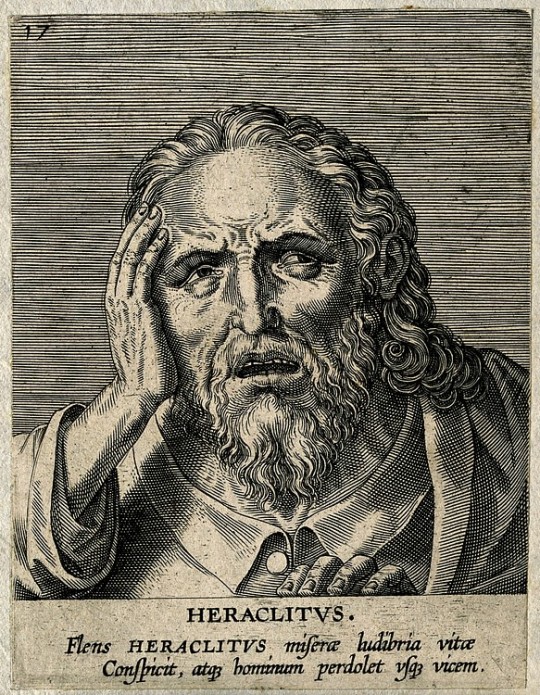#Anaximenes of Miletus
Explore tagged Tumblr posts
Video
youtube
🔵 Anaximenes of Miletus / Philosophy #Knowledge #Education #Anaximenes
"JUST AS OUR SOUL, BEING AIR, CONSTRAINS US, SO BREATH AND AIR ENVELOPS THE WHOLE COSMOS."
οἷον ἡ ψυχή ἡ ἡμετέρα ἀὴρ οὖσα συγκρατεῖ ἡμᾶς, καὶ ὅλον τὸν κόσμον πνεῦμα καὶ ἀὴρ περιέχει
ANAXIMENES OF MILETUS
ANAXIMENES OF MILETUS WAS AN ANCIENT GREEK, PRE-SOCRATIC PHILOSOPHER... HE WAS THE LAST OF THE THREE PHILOSOPHERS OF THE MILESIAN SCHOOL, AFTER THALES AND ANAXIMANDER.
#youtube#history and philosophy#western philosophy#metaphysics#anaximenes#anaximenes of miletus#knowledge#natural philosophy#arche#air#wisdom#wisdom quotes#inna besedina#self-development#self-growth#self-improvement#philosophy#philosophical#philosophical quotes#education#educational#educational video#self-improvement quotes#philosophical thoughts#philosophical wisdom
1 note
·
View note
Text
A gigantic feat of erudition Eusebius' “Praeparitio” printed by Zel.
945G Eusebius of Caesarea c. 260-c. 340 Eusebius Pa[m]phili de eua[n]gelica preparac[i]o[n]e ex greco in latinu[m] translatus Incipit feliciter. [ Cologne, Ulrich Zel, not after 1473] $18,000 Folio 10 ¾ x 7 ¾ inches. [a]12, [b-o]10, [p]8 One of the earliest editions most likely the Second, (editio princeps : Venice 1470) This…

View On WordPress
#1473#Anaxagoras#Anaximenes of Miletus#“Praeparitio”#c. 260-c. 340#Democritus#euripides#Greek Philosophy#Heracleitus#Incunabula#Incunabula 1473#Moses#Pagan Theology#Plato Socrates#Thales#ULRICH ZEL
0 notes
Text
philosophy is so fucking funny, like you go all the way back to the ionian school of pre-socratic philosophy and its like everyone is out here changing up what they believe the world arises from.
Thales of Miletus believed all things are derived from water because of moistness.
Anaximenes believed everything is derived from air.
Heraclitus believed all things are derived from fire.
straight up just like switching out what came before.
(lmao i know it’s more complicated than that and they had solid reasoning, but it’s funnier to think about them just like being like “fuck you philosophy father!! the archae is this!!!”)
i love philosophy so much lmao.
#archae#philosophy#philosophy guy loves giraffes in my podcast#anaximander#Anaximenes#heraclitus#thales of miletus#socrates#pre-socratic#ionia#water womb
14 notes
·
View notes
Photo

Heraclitus: Life Is Flux
Heraclitus of Ephesus (l. c. 500 BCE) famously claimed that “life is flux” and, although he seems to have thought this observation would be clear to all, people have continued to resist change from his time to the present day. Heraclitus was one of the early Pre-Socratic philosophers, so named because they pre-date Socrates, considered the Father of Western Philosophy. The early Pre-Socratics focused on identifying the First Cause of creation – that element or energy that set all of creation in motion and sustained it – and were known as “natural philosophers” because their interest was in natural causes for previously-held supernatural phenomena as explained by the will of the gods.
His Eastern contemporary, Siddhartha Gautama (the Buddha, l. c. 563 - c. 483 BCE), recognized the same essential aspect of life: that nothing was permanent and the observable world was in a constant state of change and understood that this was the cause of human suffering: people insisted on permanence in a world of impermanence. The Buddha encouraged people to accept the essential nature of life and detach themselves from the false idea that anything they held to could be permanent. Heraclitus had the same message but with a significant difference: one could attach one's self to anything, as long as one understood it was fleeting.
The difference between the two philosophers is that Heraclitus encouraged active engagement while Buddha suggested enlightened disinterest. Buddha taught a path of gradual detachment from the mutability of the world leading to the understanding and recognition that one could live one's life fully without craving for what one lacked, fearing what one might lose, or mourning what was past. Heraclitus encouraged people to embrace change as the fundamental essence of life and live in it, even celebrate it, with total awareness of what one had and would inevitably be lost.
Although their central focus differs, their goal is the same: to awaken those who cling to what they know through fear and ignorance and allow for their movement toward a higher, more vibrant understanding of life. Interestingly, though not surprisingly, this same focus would be developed in the 20th century CE by the iconic Swiss psychiatrist Carl Jung (l. 1875-1961 CE) who emphasized the importance of the process of self-actualization – comparable to the state of awareness encouraged by Heraclitus and the Buddha – by which one could let go of childish fears and limitations to live a more mature and fulfilling life.
Heraclitus' Philosophy
Heraclitus seems to have written a number of important works but, of these, only fragments remain preserved by later writers. The early Pre-Socratic interest in identifying the First Cause began with Thales of Miletus (l. c. 585 BCE) and continued on through his student Anaximander (l. c. 610-546 BCE) and then Anaximenes (l. c. 546 BCE), all of whom inspired later philosophers such as Heraclitus.
Thales claimed the First Cause was water because water could assume various states – heated it became air (steam), frozen it became solid (ice), and so on. Anaximander rejected this and claimed the First Cause had to be a cosmic force (which he called the apeiron) far beyond any of the elements of earth, because its essence had to be a part of all of the elements of creation. Anaximenes suggested air as the fundamental element because, like Thales' water, it could assume different forms such as fire (when rarefied), water (through condensation), and maintained life.
All three of these claims recognized change as an essential aspect of the First Cause. Even so, Heraclitus rejected all three as insufficient because, it seems, they lacked an observable, transformative quality; water, the apeiron, and air could initiate transformation but not complete it. He claimed instead that the First Cause was fire – a transformative energy – because all of life, and the very nature of life, was change and transformation embodied and illustrated by the energy of fire. Fire transformed raw meat into cooked food, cool air into warm, wood into ash, darkness to light and so, he claimed, was clearly the First Cause.
Heraclitus is said to have born to an aristocratic family of Ephesus but, whether he actually was, is said to have maintained a superior attitude toward others throughout his life. His philosophy is said to have developed from this attitude as he believed that most people he encountered were beneath him and were, in fact, spiritually and intellectually asleep. It could well be, however, that Heraclitus was simply an astute observer of the human condition and recognized that most people were, in fact, asleep in their lives – as he says - surrendering their own judgments to popular opinion and betraying their dreams in the interests of others. Heraclitus seems to have phrased his philosophy in such a way as to wake people up and force them to confront their own spiritual laziness and emotional lethargy.
It is unclear, owing to his phrasing and the few fragments left of his writing, what his philosophy consisted of outside of the claim that life is constant change, but it seems he advocated for complete awareness of existence in the form of simply paying attention and remaining critical of other people's definitions or declarations of truth. He regularly criticized his fellow philosophers and earlier writers, doubted the opinions of professionals in any area, and believed he understood best how to navigate the path of his own life.
He is probably best known for his oft-misquoted assertion, "You can't step into the same river twice" which is usually directly translated as "In the same river we both step and do not step, we are and are not" (Baird, 20). What Heraclitus meant is that the world is in a constant state of change and, while one may step from the banks into the bed of a river one has walked in before, the waters flowing over one's feet will never be the same waters that flowed even a moment before. In the same way, moment to moment, life is in a constant state of change and, in his view, one can never even count on the certainty of being able to walk into the same room of one's house one moment as one might the next.
Continue reading...
42 notes
·
View notes
Photo

Kurşunlu Monastery
The Kurşunlu Monastery is located about 10-12 kilometers from Davutlar. It can be reached by an unpaved road to the right of Cumhuriyet Square. The monastery is built at an altitude of 600 meters, similar to the House of Mary in Ephesus. It was constructed during the Byzantine period.
The monastery has a courtyard with a church surrounded by several buildings, including a storeroom, dining hall, kitchen, friar rooms, cistern, and a cemetery.
The Greeks called this monastery “Panaghia Kurshuniatissa.” The word “Panaghia” means “The Saints of all Saints” and refers to the Virgin Mary. They also called the House of Virgin Mary in Ephesus “Panaghia Kapulu,” which means “the door of the Saint of all Saints.”
The monastery is surrounded by forest and unfortunately, treasure hunters have destroyed most of its frescoes over time. The name of the monastery comes from its leaded dome Customized Tour Bulgaria.
Priene
Priene is located next to Güllubahçe Village. It sits on a terrace that overlooks the plain, which was once silted by the Meander River. Founded around 350 BC, Priene was not a large city, but it was politically very important. It housed the sacred Altar of Poseidon, a symbol of the twelve cities of the Panionian Confederation.
Priene is famous for its well-preserved architecture, including the temple of Athena, a sanctuary dedicated to Alexander the Great, and an amazing theatre. The theatre has the altar of Dionysus, the god of spectacle and enjoyment, and the special seats for local dignitaries are still intact.
The Bouleterion (the council chamber with 640 seats) and the Prytaneion (office for the executive committee) are other interesting places to visit in Priene.
Miletus
Miletus is a quiet, ancient ruin that has little visible evidence of its golden age during the 7th and 6th centuries BC. Few cities in ancient times achieved such power and brilliance.
Miletus was a center for gathering knowledge from civilizations, including Mesopotamia, Egypt, and Asia Minor. Great thinkers like Thales, Anaximander, and Anaximenes studied nature and developed ideas that were as advanced as today’s modern science.
0 notes
Photo

Kurşunlu Monastery
The Kurşunlu Monastery is located about 10-12 kilometers from Davutlar. It can be reached by an unpaved road to the right of Cumhuriyet Square. The monastery is built at an altitude of 600 meters, similar to the House of Mary in Ephesus. It was constructed during the Byzantine period.
The monastery has a courtyard with a church surrounded by several buildings, including a storeroom, dining hall, kitchen, friar rooms, cistern, and a cemetery.
The Greeks called this monastery “Panaghia Kurshuniatissa.” The word “Panaghia” means “The Saints of all Saints” and refers to the Virgin Mary. They also called the House of Virgin Mary in Ephesus “Panaghia Kapulu,” which means “the door of the Saint of all Saints.”
The monastery is surrounded by forest and unfortunately, treasure hunters have destroyed most of its frescoes over time. The name of the monastery comes from its leaded dome Customized Tour Bulgaria.
Priene
Priene is located next to Güllubahçe Village. It sits on a terrace that overlooks the plain, which was once silted by the Meander River. Founded around 350 BC, Priene was not a large city, but it was politically very important. It housed the sacred Altar of Poseidon, a symbol of the twelve cities of the Panionian Confederation.
Priene is famous for its well-preserved architecture, including the temple of Athena, a sanctuary dedicated to Alexander the Great, and an amazing theatre. The theatre has the altar of Dionysus, the god of spectacle and enjoyment, and the special seats for local dignitaries are still intact.
The Bouleterion (the council chamber with 640 seats) and the Prytaneion (office for the executive committee) are other interesting places to visit in Priene.
Miletus
Miletus is a quiet, ancient ruin that has little visible evidence of its golden age during the 7th and 6th centuries BC. Few cities in ancient times achieved such power and brilliance.
Miletus was a center for gathering knowledge from civilizations, including Mesopotamia, Egypt, and Asia Minor. Great thinkers like Thales, Anaximander, and Anaximenes studied nature and developed ideas that were as advanced as today’s modern science.
0 notes
Photo

Kurşunlu Monastery
The Kurşunlu Monastery is located about 10-12 kilometers from Davutlar. It can be reached by an unpaved road to the right of Cumhuriyet Square. The monastery is built at an altitude of 600 meters, similar to the House of Mary in Ephesus. It was constructed during the Byzantine period.
The monastery has a courtyard with a church surrounded by several buildings, including a storeroom, dining hall, kitchen, friar rooms, cistern, and a cemetery.
The Greeks called this monastery “Panaghia Kurshuniatissa.” The word “Panaghia” means “The Saints of all Saints” and refers to the Virgin Mary. They also called the House of Virgin Mary in Ephesus “Panaghia Kapulu,” which means “the door of the Saint of all Saints.”
The monastery is surrounded by forest and unfortunately, treasure hunters have destroyed most of its frescoes over time. The name of the monastery comes from its leaded dome Customized Tour Bulgaria.
Priene
Priene is located next to Güllubahçe Village. It sits on a terrace that overlooks the plain, which was once silted by the Meander River. Founded around 350 BC, Priene was not a large city, but it was politically very important. It housed the sacred Altar of Poseidon, a symbol of the twelve cities of the Panionian Confederation.
Priene is famous for its well-preserved architecture, including the temple of Athena, a sanctuary dedicated to Alexander the Great, and an amazing theatre. The theatre has the altar of Dionysus, the god of spectacle and enjoyment, and the special seats for local dignitaries are still intact.
The Bouleterion (the council chamber with 640 seats) and the Prytaneion (office for the executive committee) are other interesting places to visit in Priene.
Miletus
Miletus is a quiet, ancient ruin that has little visible evidence of its golden age during the 7th and 6th centuries BC. Few cities in ancient times achieved such power and brilliance.
Miletus was a center for gathering knowledge from civilizations, including Mesopotamia, Egypt, and Asia Minor. Great thinkers like Thales, Anaximander, and Anaximenes studied nature and developed ideas that were as advanced as today’s modern science.
0 notes
Photo

Kurşunlu Monastery
The Kurşunlu Monastery is located about 10-12 kilometers from Davutlar. It can be reached by an unpaved road to the right of Cumhuriyet Square. The monastery is built at an altitude of 600 meters, similar to the House of Mary in Ephesus. It was constructed during the Byzantine period.
The monastery has a courtyard with a church surrounded by several buildings, including a storeroom, dining hall, kitchen, friar rooms, cistern, and a cemetery.
The Greeks called this monastery “Panaghia Kurshuniatissa.” The word “Panaghia” means “The Saints of all Saints” and refers to the Virgin Mary. They also called the House of Virgin Mary in Ephesus “Panaghia Kapulu,” which means “the door of the Saint of all Saints.”
The monastery is surrounded by forest and unfortunately, treasure hunters have destroyed most of its frescoes over time. The name of the monastery comes from its leaded dome Customized Tour Bulgaria.
Priene
Priene is located next to Güllubahçe Village. It sits on a terrace that overlooks the plain, which was once silted by the Meander River. Founded around 350 BC, Priene was not a large city, but it was politically very important. It housed the sacred Altar of Poseidon, a symbol of the twelve cities of the Panionian Confederation.
Priene is famous for its well-preserved architecture, including the temple of Athena, a sanctuary dedicated to Alexander the Great, and an amazing theatre. The theatre has the altar of Dionysus, the god of spectacle and enjoyment, and the special seats for local dignitaries are still intact.
The Bouleterion (the council chamber with 640 seats) and the Prytaneion (office for the executive committee) are other interesting places to visit in Priene.
Miletus
Miletus is a quiet, ancient ruin that has little visible evidence of its golden age during the 7th and 6th centuries BC. Few cities in ancient times achieved such power and brilliance.
Miletus was a center for gathering knowledge from civilizations, including Mesopotamia, Egypt, and Asia Minor. Great thinkers like Thales, Anaximander, and Anaximenes studied nature and developed ideas that were as advanced as today’s modern science.
0 notes
Photo

Kurşunlu Monastery
The Kurşunlu Monastery is located about 10-12 kilometers from Davutlar. It can be reached by an unpaved road to the right of Cumhuriyet Square. The monastery is built at an altitude of 600 meters, similar to the House of Mary in Ephesus. It was constructed during the Byzantine period.
The monastery has a courtyard with a church surrounded by several buildings, including a storeroom, dining hall, kitchen, friar rooms, cistern, and a cemetery.
The Greeks called this monastery “Panaghia Kurshuniatissa.” The word “Panaghia” means “The Saints of all Saints” and refers to the Virgin Mary. They also called the House of Virgin Mary in Ephesus “Panaghia Kapulu,” which means “the door of the Saint of all Saints.”
The monastery is surrounded by forest and unfortunately, treasure hunters have destroyed most of its frescoes over time. The name of the monastery comes from its leaded dome Customized Tour Bulgaria.
Priene
Priene is located next to Güllubahçe Village. It sits on a terrace that overlooks the plain, which was once silted by the Meander River. Founded around 350 BC, Priene was not a large city, but it was politically very important. It housed the sacred Altar of Poseidon, a symbol of the twelve cities of the Panionian Confederation.
Priene is famous for its well-preserved architecture, including the temple of Athena, a sanctuary dedicated to Alexander the Great, and an amazing theatre. The theatre has the altar of Dionysus, the god of spectacle and enjoyment, and the special seats for local dignitaries are still intact.
The Bouleterion (the council chamber with 640 seats) and the Prytaneion (office for the executive committee) are other interesting places to visit in Priene.
Miletus
Miletus is a quiet, ancient ruin that has little visible evidence of its golden age during the 7th and 6th centuries BC. Few cities in ancient times achieved such power and brilliance.
Miletus was a center for gathering knowledge from civilizations, including Mesopotamia, Egypt, and Asia Minor. Great thinkers like Thales, Anaximander, and Anaximenes studied nature and developed ideas that were as advanced as today’s modern science.
0 notes
Photo

Kurşunlu Monastery
The Kurşunlu Monastery is located about 10-12 kilometers from Davutlar. It can be reached by an unpaved road to the right of Cumhuriyet Square. The monastery is built at an altitude of 600 meters, similar to the House of Mary in Ephesus. It was constructed during the Byzantine period.
The monastery has a courtyard with a church surrounded by several buildings, including a storeroom, dining hall, kitchen, friar rooms, cistern, and a cemetery.
The Greeks called this monastery “Panaghia Kurshuniatissa.” The word “Panaghia” means “The Saints of all Saints” and refers to the Virgin Mary. They also called the House of Virgin Mary in Ephesus “Panaghia Kapulu,” which means “the door of the Saint of all Saints.”
The monastery is surrounded by forest and unfortunately, treasure hunters have destroyed most of its frescoes over time. The name of the monastery comes from its leaded dome Customized Tour Bulgaria.
Priene
Priene is located next to Güllubahçe Village. It sits on a terrace that overlooks the plain, which was once silted by the Meander River. Founded around 350 BC, Priene was not a large city, but it was politically very important. It housed the sacred Altar of Poseidon, a symbol of the twelve cities of the Panionian Confederation.
Priene is famous for its well-preserved architecture, including the temple of Athena, a sanctuary dedicated to Alexander the Great, and an amazing theatre. The theatre has the altar of Dionysus, the god of spectacle and enjoyment, and the special seats for local dignitaries are still intact.
The Bouleterion (the council chamber with 640 seats) and the Prytaneion (office for the executive committee) are other interesting places to visit in Priene.
Miletus
Miletus is a quiet, ancient ruin that has little visible evidence of its golden age during the 7th and 6th centuries BC. Few cities in ancient times achieved such power and brilliance.
Miletus was a center for gathering knowledge from civilizations, including Mesopotamia, Egypt, and Asia Minor. Great thinkers like Thales, Anaximander, and Anaximenes studied nature and developed ideas that were as advanced as today’s modern science.
0 notes
Photo

Kurşunlu Monastery
The Kurşunlu Monastery is located about 10-12 kilometers from Davutlar. It can be reached by an unpaved road to the right of Cumhuriyet Square. The monastery is built at an altitude of 600 meters, similar to the House of Mary in Ephesus. It was constructed during the Byzantine period.
The monastery has a courtyard with a church surrounded by several buildings, including a storeroom, dining hall, kitchen, friar rooms, cistern, and a cemetery.
The Greeks called this monastery “Panaghia Kurshuniatissa.” The word “Panaghia” means “The Saints of all Saints” and refers to the Virgin Mary. They also called the House of Virgin Mary in Ephesus “Panaghia Kapulu,” which means “the door of the Saint of all Saints.”
The monastery is surrounded by forest and unfortunately, treasure hunters have destroyed most of its frescoes over time. The name of the monastery comes from its leaded dome Customized Tour Bulgaria.
Priene
Priene is located next to Güllubahçe Village. It sits on a terrace that overlooks the plain, which was once silted by the Meander River. Founded around 350 BC, Priene was not a large city, but it was politically very important. It housed the sacred Altar of Poseidon, a symbol of the twelve cities of the Panionian Confederation.
Priene is famous for its well-preserved architecture, including the temple of Athena, a sanctuary dedicated to Alexander the Great, and an amazing theatre. The theatre has the altar of Dionysus, the god of spectacle and enjoyment, and the special seats for local dignitaries are still intact.
The Bouleterion (the council chamber with 640 seats) and the Prytaneion (office for the executive committee) are other interesting places to visit in Priene.
Miletus
Miletus is a quiet, ancient ruin that has little visible evidence of its golden age during the 7th and 6th centuries BC. Few cities in ancient times achieved such power and brilliance.
Miletus was a center for gathering knowledge from civilizations, including Mesopotamia, Egypt, and Asia Minor. Great thinkers like Thales, Anaximander, and Anaximenes studied nature and developed ideas that were as advanced as today’s modern science.
0 notes
Photo

Kurşunlu Monastery
The Kurşunlu Monastery is located about 10-12 kilometers from Davutlar. It can be reached by an unpaved road to the right of Cumhuriyet Square. The monastery is built at an altitude of 600 meters, similar to the House of Mary in Ephesus. It was constructed during the Byzantine period.
The monastery has a courtyard with a church surrounded by several buildings, including a storeroom, dining hall, kitchen, friar rooms, cistern, and a cemetery.
The Greeks called this monastery “Panaghia Kurshuniatissa.” The word “Panaghia” means “The Saints of all Saints” and refers to the Virgin Mary. They also called the House of Virgin Mary in Ephesus “Panaghia Kapulu,” which means “the door of the Saint of all Saints.”
The monastery is surrounded by forest and unfortunately, treasure hunters have destroyed most of its frescoes over time. The name of the monastery comes from its leaded dome Customized Tour Bulgaria.
Priene
Priene is located next to Güllubahçe Village. It sits on a terrace that overlooks the plain, which was once silted by the Meander River. Founded around 350 BC, Priene was not a large city, but it was politically very important. It housed the sacred Altar of Poseidon, a symbol of the twelve cities of the Panionian Confederation.
Priene is famous for its well-preserved architecture, including the temple of Athena, a sanctuary dedicated to Alexander the Great, and an amazing theatre. The theatre has the altar of Dionysus, the god of spectacle and enjoyment, and the special seats for local dignitaries are still intact.
The Bouleterion (the council chamber with 640 seats) and the Prytaneion (office for the executive committee) are other interesting places to visit in Priene.
Miletus
Miletus is a quiet, ancient ruin that has little visible evidence of its golden age during the 7th and 6th centuries BC. Few cities in ancient times achieved such power and brilliance.
Miletus was a center for gathering knowledge from civilizations, including Mesopotamia, Egypt, and Asia Minor. Great thinkers like Thales, Anaximander, and Anaximenes studied nature and developed ideas that were as advanced as today’s modern science.
1 note
·
View note
Text
The “Praeparitio” is a gigantic feat of erudition.
945G Eusebius of Caesarea c. 260-c. 340 Eusebius Pa[m]phili de eua[n]gelica preparac[i]o[n]e ex greco in latinu[m] translatus Incipit feliciter. [ Cologne, Ulrich Zel, not after 1473] $18,000 Folio 10 ¾ x 7 ¾ inches. [a]12, [b-o]10, [p]8 One of the earliest editions most likely the Second, (editio princeps : Venice 1470) This…

View On WordPress
#1473#Anaxagoras#Anaximenes of Miletus#“Praeparitio”#c. 260-c. 340#Democritus#euripides#Greek Philosophy#Heracleitus#Incunabula#Incunabula 1473#Moses#Pagan Theology#Plato Socrates#Thales#ULRICH ZEL
0 notes
Photo

Kurşunlu Monastery
The Kurşunlu Monastery is located about 10-12 kilometers from Davutlar. It can be reached by an unpaved road to the right of Cumhuriyet Square. The monastery is built at an altitude of 600 meters, similar to the House of Mary in Ephesus. It was constructed during the Byzantine period.
The monastery has a courtyard with a church surrounded by several buildings, including a storeroom, dining hall, kitchen, friar rooms, cistern, and a cemetery.
The Greeks called this monastery “Panaghia Kurshuniatissa.” The word “Panaghia” means “The Saints of all Saints” and refers to the Virgin Mary. They also called the House of Virgin Mary in Ephesus “Panaghia Kapulu,” which means “the door of the Saint of all Saints.”
The monastery is surrounded by forest and unfortunately, treasure hunters have destroyed most of its frescoes over time. The name of the monastery comes from its leaded dome Customized Tour Bulgaria.
Priene
Priene is located next to Güllubahçe Village. It sits on a terrace that overlooks the plain, which was once silted by the Meander River. Founded around 350 BC, Priene was not a large city, but it was politically very important. It housed the sacred Altar of Poseidon, a symbol of the twelve cities of the Panionian Confederation.
Priene is famous for its well-preserved architecture, including the temple of Athena, a sanctuary dedicated to Alexander the Great, and an amazing theatre. The theatre has the altar of Dionysus, the god of spectacle and enjoyment, and the special seats for local dignitaries are still intact.
The Bouleterion (the council chamber with 640 seats) and the Prytaneion (office for the executive committee) are other interesting places to visit in Priene.
Miletus
Miletus is a quiet, ancient ruin that has little visible evidence of its golden age during the 7th and 6th centuries BC. Few cities in ancient times achieved such power and brilliance.
Miletus was a center for gathering knowledge from civilizations, including Mesopotamia, Egypt, and Asia Minor. Great thinkers like Thales, Anaximander, and Anaximenes studied nature and developed ideas that were as advanced as today’s modern science.
0 notes
Photo

Kurşunlu Monastery
The Kurşunlu Monastery is located about 10-12 kilometers from Davutlar. It can be reached by an unpaved road to the right of Cumhuriyet Square. The monastery is built at an altitude of 600 meters, similar to the House of Mary in Ephesus. It was constructed during the Byzantine period.
The monastery has a courtyard with a church surrounded by several buildings, including a storeroom, dining hall, kitchen, friar rooms, cistern, and a cemetery.
The Greeks called this monastery “Panaghia Kurshuniatissa.” The word “Panaghia” means “The Saints of all Saints” and refers to the Virgin Mary. They also called the House of Virgin Mary in Ephesus “Panaghia Kapulu,” which means “the door of the Saint of all Saints.”
The monastery is surrounded by forest and unfortunately, treasure hunters have destroyed most of its frescoes over time. The name of the monastery comes from its leaded dome Customized Tour Bulgaria.
Priene
Priene is located next to Güllubahçe Village. It sits on a terrace that overlooks the plain, which was once silted by the Meander River. Founded around 350 BC, Priene was not a large city, but it was politically very important. It housed the sacred Altar of Poseidon, a symbol of the twelve cities of the Panionian Confederation.
Priene is famous for its well-preserved architecture, including the temple of Athena, a sanctuary dedicated to Alexander the Great, and an amazing theatre. The theatre has the altar of Dionysus, the god of spectacle and enjoyment, and the special seats for local dignitaries are still intact.
The Bouleterion (the council chamber with 640 seats) and the Prytaneion (office for the executive committee) are other interesting places to visit in Priene.
Miletus
Miletus is a quiet, ancient ruin that has little visible evidence of its golden age during the 7th and 6th centuries BC. Few cities in ancient times achieved such power and brilliance.
Miletus was a center for gathering knowledge from civilizations, including Mesopotamia, Egypt, and Asia Minor. Great thinkers like Thales, Anaximander, and Anaximenes studied nature and developed ideas that were as advanced as today’s modern science.
0 notes
Photo

Kurşunlu Monastery
The Kurşunlu Monastery is located about 10-12 kilometers from Davutlar. It can be reached by an unpaved road to the right of Cumhuriyet Square. The monastery is built at an altitude of 600 meters, similar to the House of Mary in Ephesus. It was constructed during the Byzantine period.
The monastery has a courtyard with a church surrounded by several buildings, including a storeroom, dining hall, kitchen, friar rooms, cistern, and a cemetery.
The Greeks called this monastery “Panaghia Kurshuniatissa.” The word “Panaghia” means “The Saints of all Saints” and refers to the Virgin Mary. They also called the House of Virgin Mary in Ephesus “Panaghia Kapulu,” which means “the door of the Saint of all Saints.”
The monastery is surrounded by forest and unfortunately, treasure hunters have destroyed most of its frescoes over time. The name of the monastery comes from its leaded dome Customized Tour Bulgaria.
Priene
Priene is located next to Güllubahçe Village. It sits on a terrace that overlooks the plain, which was once silted by the Meander River. Founded around 350 BC, Priene was not a large city, but it was politically very important. It housed the sacred Altar of Poseidon, a symbol of the twelve cities of the Panionian Confederation.
Priene is famous for its well-preserved architecture, including the temple of Athena, a sanctuary dedicated to Alexander the Great, and an amazing theatre. The theatre has the altar of Dionysus, the god of spectacle and enjoyment, and the special seats for local dignitaries are still intact.
The Bouleterion (the council chamber with 640 seats) and the Prytaneion (office for the executive committee) are other interesting places to visit in Priene.
Miletus
Miletus is a quiet, ancient ruin that has little visible evidence of its golden age during the 7th and 6th centuries BC. Few cities in ancient times achieved such power and brilliance.
Miletus was a center for gathering knowledge from civilizations, including Mesopotamia, Egypt, and Asia Minor. Great thinkers like Thales, Anaximander, and Anaximenes studied nature and developed ideas that were as advanced as today’s modern science.
0 notes